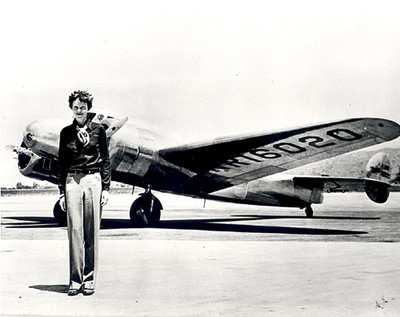Wed, Aug 28, 2024
Drone-Mounted Magnetometers Used To Detect Aircraft Remnants
The Discovery Channel recently released a documentary titled “Finding Amelia”. It showcases an expedition to unearth the fate of legendary aviator Amelia Earhart, which was conducted using drone-mounted magnetometers.

In 1937, Amelia Earhart disappeared over the Pacific Ocean while attempting a round-the-world flight. If she had been successful, she would have become the first person to circumnavigate the globe around the equator. Numerous research teams have organized missions and created theories on the cause of her disappearance, but the remains of her and her aircraft have yet to be discovered.
The "Finding Amelia" documentary features one of the latest, and most successful, efforts. The expedition began in February 2021 with Ric Gillespie and SPH Engineering’s teams.
The journey occurred in the jungles of New Britain in Papua New Guinea. The team arrived on site carrying a load of drones equipped with magnetometer, LiDar, and photogrammetry tech. Before the true search could occur, they used a small drone with a camera to map out the search area. Then, they used LiDAR scans to build Digital Surface Models and Digital Terrain Models. This data was essential in planning out the mission.
The team found that the average vegetation height in the zone was 10-15m. While this permitted the detection of aircraft engines using a magnetometer, outlying treetop heights posed a challenge for magnetic survey planning. They decided to switch back to LiDAR and completed dozens of low-altitude flights. In this, they found what seemed to be hidden Japanese troop trails and an object which bore a resemblance to Earhart’s Lockheed Electra.

“We view the expedition as a success on multiple levels,” explained Alexey Dobrovolskiy, SPH Engineering CEO. “It gave us invaluable experience in extreme conditions and allowed us to test and enhance our technologies. We are truly thankful for the opportunity to contribute to such a historic mission and look forward to being part of similar expeditions in the future.”
“Finding Amelia” aired on August 7 on the Discovery Channel.
More News
From 2023 (YouTube Edition): "Ain’t Your Daddy’s Super Cub”—Don Wade Co-owned by Don and Ron Wade—the former of Don’s Dream Machines, a storied >[...]
Pilot-Rated Passenger Reported That The Pilot Did Not Adequately “Round Out” The Landing Flare And The Airplane Bounced And Yawed To The Right Analysis: The pilot state>[...]
Dead Reckoning Dead reckoning, as applied to flying, is the navigation of an airplane solely by means of computations based on airspeed, course, heading, wind direction, and speed,>[...]
Aero Linx: Lake Amphibian Club This website is created and sponsored by the Lake Amphibian Club, to help spread the word about these wonderful, versatile amphibians that can land j>[...]
“I am deeply honored to be sworn in as NASA administrator. NASA’s mission is as imperative and urgent as ever — to push the boundaries of human exploration, ignit>[...]
 Classic Aero-TV: In Praise of Alabamas Patriot Aircraft USA
Classic Aero-TV: In Praise of Alabamas Patriot Aircraft USA NTSB Final Report: Cirrus Design Corp SR22
NTSB Final Report: Cirrus Design Corp SR22 ANN's Daily Aero-Term (12.21.25): Dead Reckoning
ANN's Daily Aero-Term (12.21.25): Dead Reckoning ANN's Daily Aero-Linx (12.21.25)
ANN's Daily Aero-Linx (12.21.25) Aero-News: Quote of the Day (12.21.25)
Aero-News: Quote of the Day (12.21.25)




